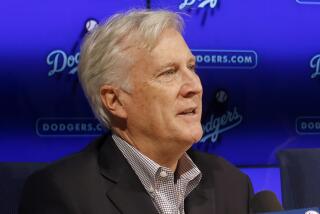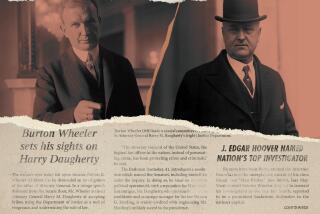Wireless Connections
- Share via
WASHINGTON — With his six cell phones and million-dollar salary, Tom Wheeler stands out even among Washington’s army of high-powered lobbyists.
His communications arsenal and hefty pay--among the highest of any Washington lobbyist--underscore his rise from Fuller brush salesman to the top ranks of Washington’s influence peddlers as president of the Cellular Telecommunications and Internet Assn.
During his 10 years as head of the group, Wheeler, 56, has helped the wireless industry recover from near-crippling allegations that cell phones cause cancer, successfully lobbied federal lawmakers to roll back state and local regulation of mobile carriers and outmaneuvered the Pentagon to win the transfer of hundreds of megahertz of valuable wireless airwaves from the Defense Department to commercial carriers. The latter move has helped fuel a huge expansion of the mobile phone market, which has 137 million subscribers.
“Tom Wheeler is the rock star of telecom,” said Pat Mitchell, president of the Public Broadcasting Service, an Alexandria, Va.-based trade group. “He’s always the one that shakes things up a bit ... and makes people listen to what he has to say.”
But this year, Wheeler’s leadership is being tested as local, state and federal lawmakers come under pressure to crack down on the industry amid safety concerns and spreading financial calamity that has plunged wireless carriers into debt.
On Aug. 16, New York City Councilman Philip Reed introduced a measure to ban cell phones in public places throughout the city, including libraries, movie theaters and museums, saying the devices are “distracting” and “a public nuisance.” The measure, which has little chance of passing, comes less than a year after the state made it illegal to use a hand-held cell phone while operating a motor vehicle.
In Washington, federal regulators are pushing initiatives that would require the wireless industry to spend billions of dollars to expand capacity and offer new services.
More ominous, lawmakers such as Rep. Edward J. Markey (D-Mass.) and Sen. Ron Wyden (D-Ore.) are resurrecting cell phone safety concerns and pressuring Federal Communications Commission Chairman Michael K. Powell to protect consumers from financially unstable telecom providers.
During the industry’s boom times, Wheeler kept lawmakers and regulators at bay with a powerful message: Unfettered by heavy government regulation, the wireless industry has boosted the nation’s economy over the last decade and produced tens of thousands of jobs.
But with industry growth slowing and regulators angling for a crackdown, Wheeler will need to shift gears. He must seek out industry allies, leverage the political clout of the nation’s wireless subscribers and secure more precious airwaves so the industry can continue to grow, colleagues and analysts say. Many think Wheeler, who already has broadened the cellular association’s core membership to include powerful technology companies such as Microsoft Corp., is more than up to the task of fending off industry opponents.
“Tom can stick the knife in one of his rivals and the rival feels he has been patted on the back,” said former FCC Chairman Reed E. Hundt. Wheeler describes his political survival instincts more succinctly: “When you’re losing the battle,” he said, “change the rules.”
Wheeler says that although wireless carriers support efforts to increase cell phone safety and competition in the industry, many government get-tough efforts are ill-advised. He said looming government mandates to create a $1-billion phone number conservation plan as well as new technology to pinpoint the location of a mobile user dialing 911 “take millions of dollars away from what customers say is their No. 1 request, and that’s better service quality.”
The son of an Ohio insurance agent, Wheeler gave little thought to Washington or communications technology while growing up. Instead, he chose to remain in the Midwest and follow his father’s path as a salesman. Wheeler’s first job out of Ohio State University was selling Fuller brushes door to door.
He can still recite his Fuller brush sales pitch but says it still smarts to recall the many doors closed in his face while he was pitching the product.
The unpleasant encounters triggered a career change. In the early 1970s, Wheeler became a lobbyist for the Grocery Manufacturer’s Assn. in Washington and later moved on to lobby for the National Cable Television Assn., also in Washington.
At the TV group, he developed a keen interest in technology, and in the early 1990s he quit the association to head the U.S. division of a Canadian start-up that distributed computer software over cable TV lines. Although the software sold well, the company closed down Wheeler’s unit six months after he joined.
The experience, Wheeler said, “was kind of my welcome to the real world.” Wheeler returned to Washington lobbying, taking the helm of the cellular association in 1992.
Some associates say Wheeler’s abbreviated attempt at entrepreneurship still eats at him and fuels his drive to succeed. They said Wheeler learned to fulfill his entrepreneurial ambitions in less risky and more personally rewarding ways.
In 1998, for example, Wheeler convinced the group to start Cibernet Corp., a for-profit Washington company that provides financial-settlement services for the $6 billion a year in fees that subscribers pay when roaming outside their carrier’s local calling area. Wheeler is chairman of Cibernet, which has become a lucrative venture that collects the roaming fees and re-distributes the payments among more than 300 carriers in more than 80 countries.
Although Cibernet is independently managed, industry sources say Wheeler’s post at a for-profit company that wireless companies depend on for their financial survival gives him clout few other lobbyists enjoy. Wheeler says he doesn’t play favorites among carriers--going as far as to carry wireless phones from each of the six major providers. And he points out that computers and accountants handle the distribution of roaming fees among carriers.
But some think Wheeler’s outside activities--he also sits on the board of the nonprofit Wireless Foundation, which champions educational and safety issues--detract from his primary responsibilities.
“I think sometimes Wheeler collects titles like some people collect [college] degrees,” one official said. “He’s chairman of this and president of that. I think he thinks it helps his image as a power broker ... as a force to be dealt with.”
Although Wheeler acknowledges “I’m not a modest guy,” he describes himself as a “pacifist” who seeks reconciliation over self-aggrandizement. As a lifelong Democrat, Wheeler says he doesn’t view telecom as a divisive partisan issue. Indeed, his free-market ideals could mark him as a GOP loyalist.
Wheeler cites as evidence of his pragmatic and reconciliatory side his marriage to Carol Rouze, a onetime broadcasting industry lobbyist whom Wheeler often opposed while he was lobbying for the cable industry. But when Wheeler found out Rouze shared his love of Broadway show tunes, he says, he was smitten. Their partnership has since expanded Wheeler’s interests into the arts and civic and other causes including Project Children, a program run by Wheeler’s wife that brings young leaders from strife-torn Ireland to the U.S. for reconciliation training.
Wheeler credits those outside interests and experiences with helping him to develop skills to keep his own troops in line.
This month, for instance, Nextel Communications Inc., whose president is chairman of the cellular group’s board, has waged a bitter fight with Wheeler and association members over Nextel’s bid to swap airwaves it controls that are causing interference with communications devices used by police and other public safety personnel.
After six weeks of wrangling, Nextel--the nation’s fifth-largest wireless carrier--failed to convince the association to support its proposal to trade some of its spectrum for other airwaves in a band that didn’t cause interference.
“They did not like the Nextel proposal because they wanted everyone to have an opportunity to get the spectrum,” company President Timothy M. Donahue said of other association members. “We tried to convince them otherwise, but [in the end] we decided to let the chips fall where they may.”
Donahue credited Wheeler for keeping a lid on the dispute, allowing Nextel to fully air its position to the group’s members. But Wheeler also sensed when it was time to draw the line and put the matter to a vote.
Some, however, have grumbled that Wheeler is too inwardly focused at a time of industry convergence and interdependence. Although the cellular group recently opened its membership to high-tech giants such as Microsoft and AOL Time Warner Inc., traditional long-distance and local phone carriers complain that the association doesn’t ally itself with other telecom carriers on some critical issues that cut across all segments of telecom.
“He’s always pointing out how different wireless is” from everybody else, one local telephone industry official complained.
For that, Wheeler is unapologetic. Wireless is different, he says, noting that more than 90% of all Americans have a choice of three or more wireless carriers compared with little or no choice of local phone providers. He said that if the government keeps its hands off the industry, it can continue to grow and innovate to the benefit of consumers.
“The thing that sets the wireless industry apart is that we are still showing significant revenue growth,” Wheeler said. “But the wireless industry has moved out of the go-go ‘90s where venture capitalists said, ‘We will fund your field of dreams.’ ”
“I think the biggest problem is that we all tend to define tomorrow in terms of what we know today. Particularly in a political environment,” Wheeler said. “But I’ve got one of the best jobs in Washington. You get to exist at the intersection of technology and policy in a business that is always changing.”
*
(BEGIN TEXT OF INFOBOX)
Thomas E. Wheeler
Name: Thomas E. Wheeler
Position: President of the Cellular Telecommunications & Internet Assn.
Residence: Washington, D.C.
Education: Bachelor of Science degree from Ohio State University, 1968.
Marital status: Married to Carol Rouze
Children: One daughter, 25, and a son, 15
Career: After a stint as a Fuller brush salesman in Ohio in the late 1960s and early 1970s, Wheeler became a lobbyist for the Grocery Manufacturer’s Assn. In 1976, he signed on as a lobbyist for the National Cable Television Assn., where he later served as president from 1979 to 1984. A history buff, Wheeler is the author of “Take Command! Leadership Lessons From the Civil War” (Doubleday, 2001)
On job performance: “One of the criteria of me, as a CEO, is to have the sense of sitting in the other person’s chair.... [But] one of the things I think you’ll find is that I’m not a modest guy. My management style is to set high expectations and get out of the way and let people meet them.”
Icebreaker: After signing up Mikhail S. Gorbachev to speak at a cellular association convention several years ago, Wheeler canvassed acquaintances on how to break the ice with the former Soviet leader. Wheeler learned from his friend Pat Mitchell of the Public Broadcasting Service that Gorbachev liked singer Frank Sinatra. So Wheeler brought some Sinatra albums to Gorbachev’s hotel room and the two spent the evening before Gorbachev’s speech enjoying Old Blue Eyes.






